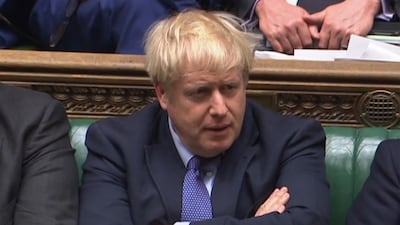With Brexit stuck in parliamentary limbo — as the government awaits a decision on a deadline extension from Brussels and the opposition is too scared to pull the trigger on a general election — the pound’s rally has subsided.
Sterling has gained 5 per cent since the UK agreed a Brexit deal with the European Union on October 17, and signs the worst scenario — a no-deal Brexit next weekend — has been effectively removed as a risk are limiting the pound's downside. Attention in the coming week will be on how long an extension the EU will grant the UK government, which will help determine when Prime Minister Boris Johnson will be able to get enough support for a general election.
While his preference December 12, it seems unlikely the opposition will back this in a vote on Monday, and more likely the Brexit extension granted by the EU will be to January 31. This probably means an election after Christmas which will contain just enough risk of a Labour government that the pound will struggle to rally much further for now. After the excitement of the last fortnight therefore, the potential rolling over of the Brexit departure date by three months will see some of the focus on the pound reduce in the coming weeks, with moderate two-way risk returning.
Some of the sting also appears to be going out of the US-China trade talks, with reports that a postponement of tariffs set to be imposed on China in December is potentially in play. China has said that parts of the text for the first phase of a trade deal with the US are "basically completed" which is raising hopes that the two sides will be able to sign this first phase at a November 16-17 Asia-Pacific Economic Cooperation summit in Chile, at which Presidents Donald Trump and Xi Jinping are scheduled to attend.
Both sides seem keen to play up the progress being made, probably for domestic political reasons in the US case as Mr Trump faces impeachment proceedings following a number of foreign policy blunders. China for its part has to contend with a sharply slowing economy with real gross domestic product growth in the third quarter posting just 6 per cent, the weakest expansion in 30 years. It is therefore probably in both parties’ interests to accentuate the positive for the time being, which should also help market sentiment to remain relatively favourable.
Into this relatively benign picture comes the Federal Reserve’s monetary policy meeting this week, which carries the potential to either perpetuate the current relative calmness in markets or to disturb it. Market confidence about a third 25 basis point rate cut this year appears to be running high, with futures prices showing a 90.4 per cent chance of a move at the October 29-30 policy meeting, to a 1.50 per cent to 1.75 per cent band and 1.625 per cent midpoint.
Given that the Fed talked of its last two moves as mid-cycle adjustments, it will be harder to portray back-to-back cuts in the same way, especially as the external threats the Fed is primarily concerned about from trade and Brexit appear to be abating. Economic data, which took a dive at the beginning of this month, has also subsequently steadied a little. If they do indeed go ahead and meet market expectations with another cut, the important thing will be to communicate a readiness to pause this rate-cutting cycle at some point in the future. The policy statement is likely to reiterate that the Fed will continue to "act as appropriate" but it also needs to delineate the circumstances in which the Fed will resist market pressure for further cuts.
Easier than doing this might be to ignore market pressure this time around and hold rates steady, demonstrating that it will not be boxed into a corner. However, to do this would risk seeing markets tumble and the current positive sentiment unravel. The markets probably rightly think that the Fed is unlikely to stand in the way of a cut this week and risk renewed volatility, but the price of this may well be a harder day of reckoning at some point down the road.
Tim Fox is chief economist and head of research at Emirates NBD


